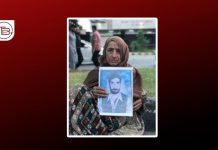Author: Fareed Baloch
In the wake of increased tensions between Iran and Pakistan, the skies of Balochistan became the backdrop for a concerning series of airstrikes. While the official narratives from Islamabad and Tehran predominantly focused on targeting militants, the stories emerging from the ground in this contested border region painted a different picture, highlighting civilian casualties and the often-overlooked suffering of the Baloch populace.
The Airstrikes: Iran and Pakistan’s Perspective
On the evening of January 16, tensions sharply escalated in Balochistan’s Panjgur district as Iran launched missile strikes in the rugged terrain of Sabz Koh. These strikes, Tehran claims, were aimed at two strongholds of Jaish al-Adl (Army of Justice), a group Iran labels as a terrorist organization operating from within Pakistan.
In a swift retaliatory move, Pakistan undertook diplomatic actions against Iran, including recalling its ambassador from Tehran and barring the Iranian envoy from returning to Islamabad. The Pakistani government strongly denounced the airstrike as an “illegal and unprovoked violation” of its sovereignty and warned of “serious consequences,” highlighting the civilian impact in Balochistan.
Less than two days after the Iranian operation, Pakistan’s military retaliated with strikes in Iran’s Sistan-Baluchistan province. Described by the Pakistani Foreign Ministry as “highly coordinated and specifically targeted precision military strikes,” these reportedly targeted alleged Baloch insurgent hideouts. The operation, named “Marg Bar Sarmachar” (Death to Guerrilla Fighters), resulted in several militant casualties, according to Pakistan.
In a notable development towards de-escalation, the two Islamic republics announced the return of their recalled ambassadors on January 26, following a joint statement issued on January 23 and a telephone conversation between the foreign ministers of Pakistan and Iran.
Civilian Casualties Amidst Iran-Pakistan Airstrikes
The recent exchange of airstrikes between Iran and Pakistan across the Eastern and Western Balochistan regions has raised significant humanitarian concerns, particularly in regard to the safety of civilians. Contrary to official statements focusing on militant targets, emerging reports from the affected areas reveal a more troubling narrative – significant civilian casualties, including women and children.
In the Panjgur district of Eastern Balochistan, Iranian airstrikes, which were reportedly aimed at Jaish al-Adl, resulted in civilian deaths. Among those injured were the three daughters and wife of Karim Dad, a resident of Sabz Koh. Tragically, Karim’s 11-month-old son Suleiman and six-year-old daughter Humaira were among those who lost their lives. Pakistani officials have also confirmed these civilian casualties, including the deaths of two children.
On the other side, Pakistan’s retaliatory strikes in Iran’s Sistan-Baluchistan province also led to civilian casualties. Notably, among those reported killed were individuals from Eastern Balochistan, including entire families who had relocated to Western Balochistan’s Shamsar (Haqabad) area to escape military strife. Notably, a family comprising Dost Mohammad, his wife Shazia, and their children Babar, Hani, and Chirag were killed. Other displaced individuals, such as Najma Baloch and her children Farhad, Mahikan, and Mahzeb, were also among the victims.
Iranian authorities acknowledged that civilians were killed in the Pakistani airstrikes and condemned the attack. According to Iranian reports, these strikes resulted in the deaths of three women, two men, and four children, none of whom were Iranian nationals.
These incidents, condemned by both Iranian and Pakistani authorities for the civilian deaths they involved, including children, underscore the precarious situation facing the Baloch populace.
The Overlooked Victims in Iran-Pakistan Airstrikes
In the shadow of the Iran-Pakistan border conflict, the voices of the Baloch people from the affected regions have largely gone unheard. Amid official claims of targeting militants, the ground realities, as narrated by the Baloch, reveal a starkly different scenario marked by civilian casualties.
Quetta-based journalist Akbar Notezai, in his report for TRTWorld, provided insight on the sentiment in Eastern Balochistan. He cites Essa Baloch, a resident of Panjgur’s Sabz Koh village, who dispels the notion that their area is a militant haven: “The Iranian authorities think anti-Iranian militants live in our villages, but there are no militants here. We are all civilians, living with our children amidst constant fear of Iranian missiles.”
In Western Balochistan, the aftermath of Pakistani airstrikes tells a similar story of civilian impact. Contrary to claims of targeting militant hideouts, these strikes hit residential areas, with devastating consequences. One such case involved the home of Dosta Mahmod, a Baloch National Movement (BNM) member, whose entire family perished in the attack.
BNM, in a social media statement, highlighted the tragedy: “The Pakistani army’s missile attacks in Western Balochistan targeted Baloch refugees, resulting in the deaths of ten women and children, including Dosta Mahmod’s family.”
The civilian toll was further highlighted by Baloch poet Sarwar Faraz. His family, who had fled military operations in Panjgur, became victims of the airstrikes. Reportedly, Pakistani forces did not permit their bodies to be buried in their hometown of Panjgur.
Addressing the issue, influential Iranian Sunni cleric Abdul Hameed, during a sermon in Zahedan, lamented the loss of lives, particularly of women and children. He urged both nations to heed their people’s grievances, suggesting that addressing internal dissatisfactions is crucial for both Iran and Pakistan.
Moreover, in Zahedan, massive protests erupted against the aerial attacks on Baloch populations. Demonstrators condemned the killing of Baloch civilians, chanting slogans like ‘Death to Iran’ and ‘Death to Pakistan.’ They accused both countries of participating in ‘Baloch genocide.’
Prominent Baloch activist, Dr. MahRang Baloch expressed her concerns on the social media platform ‘X’: “In the name of security and sovereignty, both Pakistan and Iran have endangered the lives of ordinary Baloch children and women. Under the pretext of safeguarding their security and sovereignty, missiles are indiscriminately deployed against Baloch, which has put the safety of Baloch at grave risk on both sides of the border.”
BNM chairperson Dr. Naseem Baloch condemned the airstrikes as war crimes and blatant human rights violations, highlighting the tragic fate of Dosta Mahmod’s family who were forced to migrate due to military aggression.
Similarly, journalist Malik Siraj Akbar remarked, “Iran and Pakistan’s violence against Baloch women and children in the name of national security is deplorable. Both strikes failed to target a single “militant”. The only reported victims have been Baloch women and children.”
Activist Jamal Baloch described the situation as a systemic genocide: “It isn’t a conflict between Iran & Pakistan; it’s the systematic genocide of Baloch,” he wrote. “Both countries bombed each other. How many of their soldiers were killed? None. How many of their citizens were killed? None. On both sides, Baloch civilians, including minor children, are dying.”
https://twitter.com/SammiBaluch/status/1747885600894808393
Human Rights defender Sammi Deen Baloch summarized the dire situation: “No matter who is fighting the war or who is targeting whom, it’s the Baloch being killed.”
Broader Implications of the Iran-Pakistan Conflict
The recent missile strikes by Iran and Pakistan in Eastern and Western Balochistan, targeting the alleged hideouts of Jaish al-Adl and Balochistan Liberation Front, reflect the multifaceted strategic approaches of both nations.
Tehran’s actions were primarily framed as a defense against militant threats by Iranian officials, particularly in response to incidents such as the Kerman attacks and the assault in Rask. Speaking at the World Economic Forum in Davos, Iranian Foreign Minister Hossein Amir Abdollahian drew attention to militant activities along the Pakistan-Iran border. He stated, “While we respect Pakistan’s sovereignty, our national security could not be compromised by groups inside Pakistan, including those affiliated with Israel.”
Iran’s strategy, however, transcends the immediate goal of countering a militant group. Its regional actions, evident in Pakistan, Iraq, Syria, and the Red Sea, highlight an ambition to establish itself as a dominant regional power. This broad strategy aligns with Iran’s objectives to counter external threats, particularly from forces allied with the United States and Gulf states. Domestic factors, including bolstering nationalist sentiment after recent attacks, also significantly influence Iran’s regional policies.
Similarly, Pakistan’s military response indicated a recalibration of its strategic posture. While asserting sovereignty and deterrence were primary motives, the nature of Pakistan’s response—targeting relocated Baloch families rather than direct Iranian military installations—suggested a desire to avoid a broader military escalation.
Additionally, this maneuver suggests Pakistan’s potential realignment towards countries like the United States and Saudi Arabia, amid increasing pressure from China due to the apparent shortcomings of the CPEC project. This strategic shift aims to balance immediate security concerns with long-term geopolitical objectives amidst internal political and economic challenges.
Similarly, domestic factors in Pakistan, such as bolstering nationalist sentiment and responding to the public’s concerns following recent tensions between the army and the populace, likely played a significant role in shaping this response.
Amidst the intricate geopolitical dynamics of the Iran-Pakistan border conflict, the Baloch people, situated along this volatile border, find themselves bearing the brunt of these tensions.
The targeting of Baloch civilians highlights the deep-rooted challenges faced by this ethnic group, emphasizing the urgent need for Tehran and Islamabad to address the root causes of unrest within their respective Baloch regions. Failure to address these issues means the cycle of unrest, characterized by mutual accusations and military actions, is likely to continue.
The situation also underscores the vital role of the international community in advocating for a strategic shift in the approach of both nations. Moving away from militaristic strategies to those that emphasize human rights and the welfare of the Baloch people is imperative. Constructively addressing historical grievances and fostering inclusive political dialogue are essential steps toward establishing lasting peace and stability in the region.






























